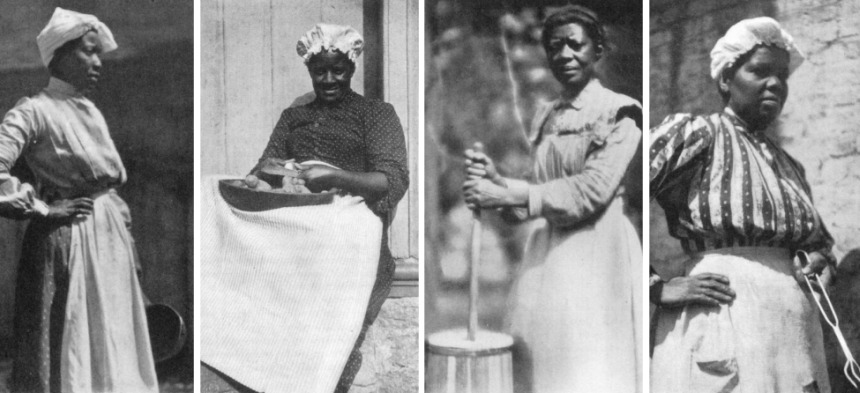As a journalist at a bloggers workshop, I was feeling a little bothered while attending South by Southwest Interactive (SXSW) this week, like a wolf in sheep’s clothing, until I realized that the women who inspire me also lived as if there were four of them.
They published cookbooks. Operated retail food businesses. Invented culinary gadgets. Hawked food products. Taught home economics. Catered lavish events. Sometimes, all at once.
As an author, I loved getting to know Abby Fisher and Malinda Russell, and imagining the kind of intelligent and creative recipes that my ancestors might have published if given the opportunity.
This week, I find muse in Kentucky, looking for the perfect mint julep to serve at a catered event next month, where I will be speaking about and teaching southern food traditions, and maybe making a dish or two.
Who me? Multi-task?
The first artifact is The Blue Grass Cook Book, by Minnie C. Fox.
Although it was not written by a black cook, the University Press of Kentucky and I published the historic reprint of Blue Grass in 2005 because it is the first-known cookbook to offer an honest and revealing picture of the state of culinary affairs in the South at the start of the twentieth century. It features more than 300 recipes and a dozen stunning camera portraits – not caricatures – of African American cooks at work. They are pictured above.
More directly than anyone before them – or after, until mid-century – Minnie, and her novelist brother John, publicly acknowledged the black contribution to Southern foodways, Southern culture, and Southern hospitality in 1904. In what amounts to direct and explicit homage, Minnie applauds the “turbaned mistress of the kitchen” for her dignity, wisdom, and talent.
This picture casts a bold shadow of hope and grace on the Aunt Jemima make-believe.
John Fox’s introduction and the photographs of Alvin Langdon Coburn do for these great cooks what historians, cookbook authors, novelists, advertisers, and manufacturers simply did not: They single out for full recognition and credit the black cook as the near-invisible but indispensable figure who made Southern cuisine famous.
Meanwhile, as housewives produced textbooks that emphasized the technical basics of cooking at the turn of the twentieth century, Effie Waller Smith wrote poetry that made powerful statements about the competencies of her African American sisters in the kitchen.
The authority and observations in her collected works, which were discovered and republished by the Schomburg Library in 1991, include interpretation, so I’ve simply included my favorite poem here for you to enjoy, and hopefully to share.
Maybe next time, I’ll attend a meeting of anthropologists.
APPLE SAUCE AND CHICKEN FRIED
By Effie Waller Smith, 1904
You may talk about the knowledge
Which our farmers’ girls have gained
From cooking-schools and cook-books
(where all modern cooks are trained);
But I would rather know just how,
(Though vainly I have tried)
To prepare, as mother used to,
Apple sauce and chicken fried.
Our modern cooks know how to fix
Their dainty dishes rare.
But, friend, just let me tell you what!–
None of them compare
With what my mother used to fix,
And for which I’ve often cried,
When I was but a little tot,–
Apple sauce and chicken fried.
Chicken a la Francaise,
Also fricassee,
Served with some new fangled sauce
Is plenty good for me,
Till I get to thinking of the home
Where I used to ‘bide
And where I used to eat, — um, my!
Apple sauce and chicken fried.
We always had it once a week,
Sometimes we had it twice;
And I have even known the time
When we have had it thrice.
Our good, yet jolly pastor,
During his circuit’s ride
With us once each week gave grateful thanks
For apple sauce and chicken fried.
Why, it seems like I can smell it,
And even taste it, too,
And see it with my natural eyes,
Though of course it can’t be true;
And it seems like I’m a child again,
Standing by mother’s side
Pulling at her dress and asking
For apple sauce and chicken fried.
Author’s Note: Use caution if you purchase The Blue Grass Cook Book from Amazon. Applewood Books is offering a reprinted copy that does not include my historical background on the Fox family. If you would like to purchase an autographed copy of The Blue Grass Cook Book, please email me.



..glad i read to the end; i was heading to amazon! i would love to have a copy.
Toni, beautiful job on this site. The poem is a beautiful, touching reminder. I think I can smell the chicken and applesauce. I want a copy, too.
Thanks, Patricia. Glad you’ve joined the conversation. I hope to hear more of your insights as we meet more of these inspirational characters. Ellen, thanks, as always.
Do you have a photo of Abby Fisher?
How can I get an autographed copy of the wonderful book
Hi Maxine – The Jemima Code is available in pre-sale right this minute. Visit the University of Texas Press website for details.